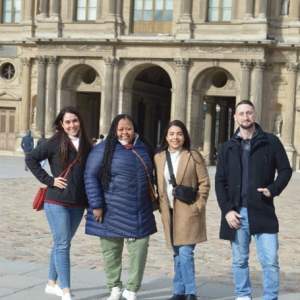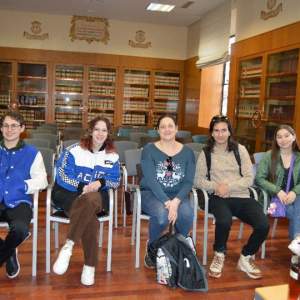Winsted, CT – Northwestern students had the opportunity to study the impact of antibiotic resistance and climate change in both Paris and Spain this spring semester, thanks to a National Science Foundation (NSF) grant.
A presentation about the trip to Spain will be held on Tuesday, March 28, noon to 1 p.m. in the Arts and Science Center Building, 209 Holabird Avenue, Winsted for those who want to learn more about the trip and Northwestern’s study abroad program.
 In March, students Luke DeMarchis, Amanda Mason, Amberlynn Montoya, and Camica White, along with Professor Sharon Gusky and Professor Emeritus Jessica Treat, spent a week at the Institute of the University of Technology (IUT) Nancy-Brabois in Nancy, France. All four students are enrolled in Professor Gusky’s microbiology class this Spring.
In March, students Luke DeMarchis, Amanda Mason, Amberlynn Montoya, and Camica White, along with Professor Sharon Gusky and Professor Emeritus Jessica Treat, spent a week at the Institute of the University of Technology (IUT) Nancy-Brabois in Nancy, France. All four students are enrolled in Professor Gusky’s microbiology class this Spring.
“Antibiotic resistance and climate change are issues that impact not only our Northwest corner but the world,” said Gusky. “To highlight the global nature of these issues and to gain insights into how educational institutions and industry collaborate to build a stronger technical workforce to help combat these issues, was the objective of the NSF funding to send students to France and Spain.”
Gusky said Microbiology students at IUT have been collaborating virtually with Northwestern microbiology students on a project identifying the location of antibiotic resistant hot spots in the environment. Students in France and the US collect and analyze soil samples for antibiotic resistant organisms and share their data with Tufts University’s PARE project, which is a classroom-based research project where students investigate the local levels of antibiotic-resistant microbes.
“While at IUT, Northwestern students attended classes with the French students and they worked together on analyzing and validating the data collected at various sites in Northwestern Connecticut,” said Gusky.
The students also visited hospital and research facilities that use Becton Dickinson’s automated medical laboratory systems. The students from Northwestern and IUT will be presenting their research finding at the National Association of Biology Teachers Virtual Student Research Poster Competition in June.
In January, STEM students Emma Da Silva-Martinez, Shannon Dickey, Rebecca Giarnese, Kevin Kinsley, Matthew Maroney, and Morgan Yelsits visited the University Complutense in Madrid and the University of Castilla-La Mancha in Toledo, Spain to learn how educational institutions and industry work together to build a stronger technical workforce to address global issues. Professors Gusky and Treat, along with Professor John Jagtiani and Peer-to-Peer Mentor Coordinator, Susan Dichter, traveled with the students also.
 “Northwestern and the Spanish Universities work with Tiny Earth Project to look for new antibiotics in the soil,” said Gusky. “In addition to learning about the Tiny Earth work in Spain, students visited with research scientists and students and learned how they are collaborating with industries to address the impacts of climate change on agricultural products, like wine and olives, and how they are working to develop more efficient solar panels.”
“Northwestern and the Spanish Universities work with Tiny Earth Project to look for new antibiotics in the soil,” said Gusky. “In addition to learning about the Tiny Earth work in Spain, students visited with research scientists and students and learned how they are collaborating with industries to address the impacts of climate change on agricultural products, like wine and olives, and how they are working to develop more efficient solar panels.”
Gusky said they also saw first-hand the impact of global climate change on bird migrations as Spain has become the preferred location for the storks that once migrated to Africa but now make their nests throughout the campus and town squares. Students also visited SAS, a statistical software and data management company with headquarters in North Carolina and in Madrid. The company works with global industries and is a leader in the data science field, which is one of Northwestern’s newest STEM programs.
“Together these trips provided Northwestern students and faculty with an opportunity to learn from, and collaborate with, international students and faculty on issues that impact us all,” said Gusky.
For more information, about Northwestern’s travel abroad program, contact Sharon Gusky at sgusky@nwcc.edu.
